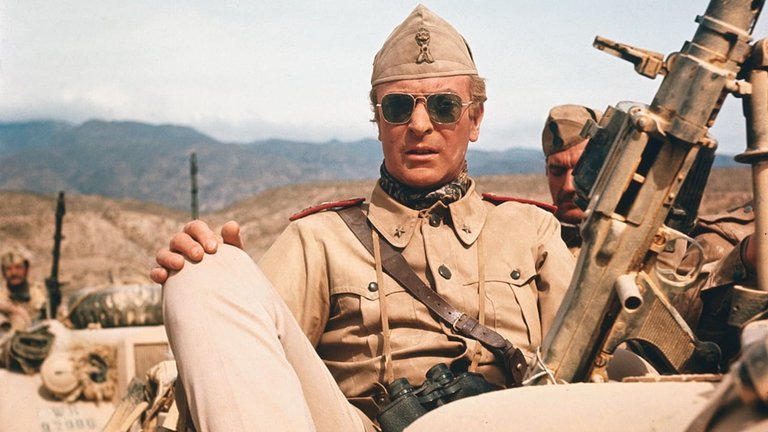
The North African Campaign (1940–1943) is often romanticised as one of World War Two’s “cleaner” theatres: a conflict waged across vast, unpopulated deserts between professional armies, devoid of the civilian massacres or ideological atrocities that stained the Eastern Front or Pacific War. Yet Play Dirty (1969), André de Toth’s gritty British war film, dismantles this myth with surgical precision. Set in 1942 during Erwin Rommel’s advance toward Egypt, the film exposes the campaign’s moral rot—not through graphic violence, but through institutional betrayal, opportunism, and the dehumanisation of soldiers reduced to pawns in a grand, futile game. Here, the desert is no noble battleground but a nihilistic arena where survival trumps heroism, and loyalty is as fleeting as a sandstorm. De Toth’s vision, steeped in late-1960s disillusionment, reframes the “Good War” as a morally bankrupt enterprise, where even Allied commanders are complicit in war crimes.
Loosely inspired by the exploits of Britain’s special forces like Long Range Desert Group, Popski’s Private Army and SAS—recently dramatised in the BBC’s Rogue Heroes—Play Dirty follows Captain Douglas (played by Michael Caine), a petroleum engineer coerced into leading a suicide mission to destroy a German fuel depot in Libya. The unit’s true leader, Captain Cyril Leech (played by Nigel Davenport), is a mercenary leading a band of criminals, addicts, and social outcasts, including two Arab guides depicted as hashish-smoking lovers—a provocative choice for 1969. Unbeknownst to Douglas, their mission is a decoy for a “proper” commando force, orchestrated by Brigadier Blore (played by Harry Andrews), who views Leech’s squad as expendable.
The trek across the Sahara—punctuated by minefields, sandstorms, and clashes with hostile tribes—serves as a metaphor for existential futility. When the squad finally reaches their target, they find a decoy depot, mirroring the hollow promises of military glory. De Toth’s decision to frame the mission as a series of logistical nightmares (tire blowouts, pulley systems for scaling cliffs) underscores the banality of war, a far cry from the romanticised heroics of earlier WWII films.
Released two years after Robert Aldrich’s The Dirty Dozen (1967), Play Dirty faced accusations of being a derivative B-movie. While both films feature criminal squads on suicide missions, the similarities end there. Aldrich’s film, though cynical, retains a Hollywood sheen: its antiheroes are charismatic rogues, and their mission—killing Nazis—feels morally justified. Play Dirty, by contrast, offers no such catharsis. Its protagonists are irredeemably venal, their mission rendered pointless by bureaucratic betrayal. As critic Dennis Schwartz notes, the film’s “nihilistic pragmatism” makes The Dirty Dozen seem almost quaint.
The film’s troubled production mirrored its bleak narrative. Originally titled Written in the Sand and set to star Richard Harris under French director René Clément, famous for his WW2-themed works, the project collapsed due to clashes between Clément and producer Harry Saltzman. De Toth, a veteran of film noirs and Westerns, stepped in, relocating filming to Spain’s Tabernas Desert—a decision that drew ire from Michael Caine, who lamented the “horse excrement” left by concurrent Western shoots.
De Toth’s direction shines in taut action sequences: ambushes are abrupt and chaotic, while the climactic raid—filmed during a sandstorm—eschews grand spectacle for claustrophobic realism. Yet the film’s pacing suffers from uneven scripting, a byproduct of Saltzman’s interference and last-minute rewrites.
Play Dirty’s greatest weakness lies in its underdeveloped characters. Nigel Davenport’s Leech is a magnetic sociopath, but his motivations—a £2,000 bounty for Douglas’ survival—feel undercooked. Nigel Green’s Colonel Masters and Harry Andrews’ Blore are caricatures of military hubris, their dialogue steeped in cliché (“War is a criminal enterprise. I fight it with criminals”).
Michael Caine’s Douglas, the nominal protagonist, undergoes a half-hearted arc from naïve officer to pragmatic survivor. Yet his transformation lacks emotional depth, reducing him to a reactive figure rather than a compelling lead.
Modern audiences may bristle at the film’s regressive tropes. The Arab guides, Hassan and Assine, are coded as predatory homosexuals—a portrayal reflecting 1960s prejudices rather than historical nuance. Worse is a harrowing attempted rape scene, where three commandos assault captured German nurse (played by Vivian Pickles). While the sequence aims to underscore the squad’s moral decay, its exploitative framing—lingering on Pickles’ terror—feels gratuitous, aligning more with grindhouse sensationalism than anti-war critique.
Play Dirty flopped upon release, a casualty of its timing. By 1969, the Vietnam War had eroded public appetite for militarism, and De Toth’s unrelenting cynicism—culminating in a bleak finale where Douglas and Leech are gunned down by their own side—proved too bitter a pill. The film’s nihilism, while prescient in critiquing institutional betrayal, clashed with prevailing WWII narratives, ensuring its commercial oblivion.
Play Dirty is no masterpiece. Its script is uneven, its characters thinly drawn, and its provocations often clumsy. Yet as a cultural artifact, it remains indispensable—a bridge between the patriotic war films of the 1950s and the radical deconstructions of the 1970s. For all its flaws, the film’s unflinching cynicism and De Toth’s visceral direction offer a stark reminder that even the “cleanest” wars are built on lies, blood, and betrayal.
RATING: 6/10 (++)
Blog in Croatian https://draxblog.com
Blog in English https://draxreview.wordpress.com/
InLeo blog https://inleo.io/@drax.leo
Hiveonboard: https://hiveonboard.com?ref=drax
InLeo: https://inleo.io/signup?referral=drax.leo
Rising Star game: https://www.risingstargame.com?referrer=drax
1Inch: https://1inch.exchange/#/r/0x83823d8CCB74F828148258BB4457642124b1328e
BTC donations: 1EWxiMiP6iiG9rger3NuUSd6HByaxQWafG
ETH donations: 0xB305F144323b99e6f8b1d66f5D7DE78B498C32A7
BCH donations: qpvxw0jax79lhmvlgcldkzpqanf03r9cjv8y6gtmk9